On a Godless Planet:Volume3A Chapter 13
Chapter 13: Mega Answer[edit]

–The truth is found in the people’s movements.
●
Athena was honestly kind of nervous.
Even when shifting from a virtual manifestation to a real manifestation, you would only rarely meet gods of other mythologies. The part of the divine world you lived in would be populated by the gods of your own and neighboring mythologies.
…So it feels like home.
When she had come here with Demeter before, it had been as inspectors.
But this time…
“There’s a meeting of the gods, right? This is our first one, but have any of you done one before?”
“Yeah. We, and the others who live here, do them from time to time. And even without an official meeting, the different clubs will sometimes get together.”
“Your cross-mythology agreements are carried out in secret?”
That was absurd.
Each mythology’s virtual manifestation was their headquarters, so the divine world where they received a real manifestation was like a branch office.
“Do the people here have the political authority from your mythologies?”
“We need enough flexibility to get things done.”
“Why? You have plenty of time, so if there are any issues, you can either call for a representative or ask the DC to send an inspector.”
“Sometimes speed is necessary. It takes too long to call in a god for each new problem that crops up.”
“Takes too long? But won’t all of you face the same delays?”
Everyone answered that question by looking in the same direction.
At the tall figure in a raincoat standing nearby.
“I do loooove raincoats. You can really feeeeel how you’re not getting wet.”
●
“Oh…monotheism and polytheism work at different speeds.”
“Yes,” said the Norse knowledge god.
“When comparing monotheism and polytheism, monotheism is a dictatorship in the truest sense of the word, which allows it to react more quickly and decisively.”
“…? What do you mean ‘a dictatorship in the truest sense of the word’?”
“With polytheism, the internal decision-making system is more like a counsel or centralized authority. There might be a dictator at the top, but that dictator has subordinates who are the ones who do the actual work.”
“Our Zeus gets into a lot of trouble on his own. How does that fit into the idea that his subordinates do the work?”
“The top can do work on private matters or as one member of the group. …And his ‘lack of inhibitions’ comes from his mythological authority, doesn’t it? Also, war and pioneering are based on the top’s authority, so he should participate in those as well.”
She sure isn’t shy, thought Athena.
She was a knowledge god. When using knowledge as a weapon, she wasn’t afraid to take on a higher-ranked god.
And Athena’s aunt fell silent for a bit.
She must have been impressed by the knowledge god’s fearless use of her area of expertise.
“Hey, Athena.”
“Yes, aunt?”
“I can’t stand to lose this argument, so can you put that brat in her place?”
“No! You can’t let yourself look so intolerant!”
“You do know we can hear this, right?”
Athena looked over to see the knowledge god hiding behind the thunder god.
“See!? Now you’ve scared her!”
“Okay, okay. I just have to resolve this peacefully, right?”
Her aunt sighed and took a look around.
“Insult Olympus and you’ll get what’s coming to you! Got that!?”
“Auuuuunt!”
●
“I see they’re still acting like gangsters.”
“You know them?”
“Some of our younger members were combined with the Greek and Roman gods, which can cause some trouble.”
“Really? Egypt is pretty big and you have those pyramids and stuff, so you’re a pretty major name in the mythological world. Aren’t you 5th gen like us?”
“We are, but our younger members are 7th or, if you count the syncretized versions, 8th.”
“Yes. Some of your gods aren’t much older than us.”
“So your myths changed over a long period of time?”
“In Egypt’s case, Alexander III’s conquest combined Greek and Egyptian cultures. This created the Hellenistic culture. Mythological syncretism was used to bring the conquerors and the conquered together.”
“That’s a lot more political than I was expecting.”
“Well, Alexander III lived in the 300s BCE and humanity was making a lot of advances then.”
Then Raidou raised his hand. He glanced over to make sure Poseidon was in “listening mode” before speaking.
“The Olympus gods probably aren’t used to all this yet. …TJ, is it all right if Kuwajiri talks about your origins?”
“Go ahead. I’m actually our current knowledge god, but it’s probably best if a third party explains it.”
●
Kuwajiri raised her hand and stepped out from behind Raidou. The way Poseidon applauded told her he really wasn’t a bad god. Clueless maybe, but not bad.
…I’m glad I let Temanko take care of Sumeragi.
She knew more about Europe and the Middle East than the Shinto knowledge god would. So…
“I’ll start with Egypt. Originally, there were villages known as sepet scattered around the Nile River west of the Arabian Peninsula and the Red Sea. To deal with flood control and irrigation, these villages joined together and sought a leader, creating a single state at around 3000 BCE.”
How large was this state?
“At the time, it covered the Nile Basin region. By 1500 BCE, it controlled the western part of the Red Sea and the eastern coast of the Mediterranean, all the way up to modern-day Syria.”
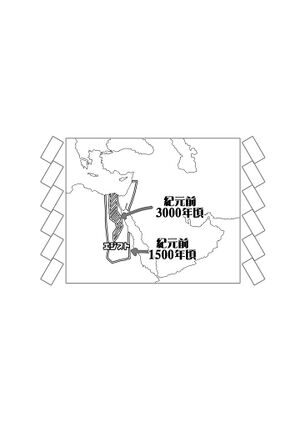
“Oh, that’s after our time, when the Babylonian Empire fell.”
“Yeah, they got a big head.”
“They what?”
This is a huge digression, Kuwajiri thought about Mr. V’s question.
But that was fine. This was their cultures, so they would know some of this already.
So she raised her hand.
“Allow me to explain from an outside perspective.”
●
Kuwajiri wanted to get this over with quickly. She ultimately wanted to explain who had “gotten a big head” and what they had done.
So she started with history.
“How did the Babylonian Empire ‘get a big head’? First, I will explain the origins of the Babylonian Empire.”
She opened a Revelation Board. It displayed the Middle East. That is, the Mesopotamian region.
“Bilgamesh-senpai ruled Uruk, which was later conquered by Akkad, a city north of Uruk. This created the Akkadian Empire, which went around conquering and expanding their territory, but due to constant uprisings, it collapsed in about 200 years.”
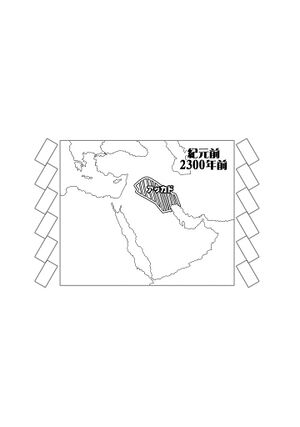
“Yeah. Even though the Akkadian Empire was a pretty tolerant leader, so the Akkadians and Sumerians got along well. That’s why their first king, Sargon, was seen as a great ruler despite being a conqueror and his daughter Enheduanna became history’s first poet who wrote poems about none other than me! Cause I’m so cute and all!”
“Her poetry wasn’t just about you. She gathered holy songs and such.”
“Don’t fuss over the details! Oh, and it was the Akkadian Empire that called me Eshtar – I was Inanna before that.”
“I was wondering about that. Why do you still go by Eshtar instead of Inanna?”
“Because it’s so cool to have my name in poetry! That’s the only reason!”
“Why does that reason piss me off so much?”
<Seriously speaking, Bilgamesh’s Inanna and Akkad’s Eshtar are thought to be based on the same goddess. So the same goddess became two different things in different places, but because Akkad treated her with such care and the king’s daughter worshiped her and wrote poetry about her, she was recombined into a single goddess.>
“Senpai-san isn’t here, but that reminds me of what happened with some of the Shinto gods.”
“In that sense, I’m like the one that ties Uruk and Akkad together. And while Enheduanna was an Akkadian princess, she actually praised me as Inanna in her poetry as an offering for peace between Akkad and Sumer. …So instead of forcing her own people’s ways onto them, she paid respect to the people of Uruk. That priestess selflessly used their god and their language to pay them that respect in her poetry, so isn’t it classy for me to repay her by using the name Eshtar that she preferred to call me?”
“…”
“You do have a way with these illogical things.”
“Ha ha! Keep the compliments coming!”
“This does prove that humanity used the invention of writing for ‘expression’ and not just records and calculations.”
“Oh?” said Raidou, raising his hand. He looked Kuwajiri’s way and asked “can I ask something?” through eye contact.
She knew what he wanted to ask, so she gave an approving nod.
“Kuwajiri? If they could do poetry, did their cuneiform writing use phonograms?”
“Phonograms?”
“Phonograms are written characters that represent sounds rather than meanings. Ideograms are written characters represent meaning and not sounds. And logograms are written characters represent sounds and meanings.”
“???”
Then TJ raised her hand.
“Take the Japanese word for sound, for example.
“––If you represent it as oto or おと, you are using phonograms.
“The alphabet and hiragana are both examples.
“––If you represent it as ♪, you are using an ideogram.
“Numbers and symbols are the main examples here.
“––If you represent it as 音, you are using a logogram.
“Kanji is a good example.”
That’s kind of an artist’s explanation, thought Kuwajiri. And Kidou and Bilgamesh nodded her way. That meant she should speak up as a knowledge god.
While this looked like a digression, it was leading them toward the correct answer. So…
“Mesopotamian cuneiform originally used logograms to write the Sumerian language. As you can clearly see with kanji, giving everything its own character leads to a large number of characters. But by improving and refining that writing system, they reached a point where they could represent poetry.”
“Also,” she continued.
“We discussed this before, but cuneiform was narrowed down to around 1000 characters around Bilgamesh-senpai’s time. By the time of the Akkadian Empire, it was further improved, bringing it down to 200 characters. By that time, the wedge shapes it was named after were replaced with angled lines and it was given phonograms known as syllabic characters.”
“Sumerian primarily used logograms with some phonograms thrown in, but it was actually missing some phonemes.”
●
“What is a phoneme?”
“I guess you could call it the types of sounds used in a language. For example, the Japanese phonemes are every sound you can make by combining the phonetic hiragana. The English phonemes are all the sounds you can make with combinations of the alphabetic letters. The number of phonemes is determined by the number of characters and by what sounds those characters can make.”
“There are a lot of languages that have a small number of characters but a large number of phonemes through character combinations like with ‘ch’ and ‘th’ or by using trilled pronunciations.”
In other words…
“The Akkadian language was a combination of many consonants and few vowels, giving it more phonemes than Sumerian. So when Sumerian was modified into Akkadian, it included kanji-like logograms, ideograms that acted as numbers, and something akin to phonograms which made recording everyday speech easier.”
What did that mean?
“It was a lot like Japanese. Because Japanese also includes phonograms, logograms, and ideograms.”
“Our stuff is based on Sumerian, but I bet I can talk so easily in this divine world because this place focuses more on the casual, sound-focused speech.”
“That is in fact the process by which Sumerian was absorbed into Akkadian.”
“So through over a millennium of practical use and life, the language was compressed and made more efficient? That feels like the opposite of creating the perfect language…but you can also say that’s why they could write poetry.”
“Ah ha ha! And since they went to such lengths to praise me, I must be the most important god in the world!”
“I am so sorry…”
“Let’s just view that as an apology to Enheduanna.”
This was all very complicated. But as a knowledge god, Kuwajiri had more to add.
“Now I’m really going to get us sidetracked,” she said. “The characters on which cuneiform was based were mixed in with Egyptian hieroglyphs, spread along the Mediterranean coast, and by around 15 centuries ago, became pure phonograms used by the Ugaritic people in Phoenicia. The Ugaritic writing system had no vowels. It had 27 consonants, 3 syllabic characters that combined a vowel and a consonant, and 1 punctuation mark, for a total of 31 characters. You could call it the most advanced version of cuneiform. It went on to influence the Phoenician language, which was only consonants and had 22 characters. And that is thought to have been the origin of the Greek writing system and the alphabet.”
●
Now, this was where it got interesting.
Kuwajiri realized Balancer had appeared, which likely meant they were willing to act as her assistant. So she decided to take it easy.
“That is how languages evolve and are refined. And when dynasties and rulers change due to conquest or destruction, something else happens.”
A hand went up. TJ’s.
“A reworking of mythology.”
“Right. If the ruler’s language changes, the land’s myths are not so easily passed down in the old language even if everyone is still familiar with them. If a writing system already exists and records can be made, then the ancient myths will be passed down in the new language.”
Meaning…
“When the Akkadian Empire fell, the Akkadian language mixed with the surrounding languages and continued to be used. Then the Third Dynasty of Ur fell and the resultant conflict led to the creation of Babylon. Babylon was led by King Hammurabi, known for the Code of Hammurabi, and it passed down the Mesopotamian myths and used the Akkadian language.”
And something else happened.
“The Mesopotamian myths were rewritten.”
●
The Mesopotamian myths were rewritten.
“That’s right,” said Kidou in response to that idea.
“Babylon worshiped a regional god named Marduk, who was barely spoken of at all in our time. But to bolster the legitimacy of the throne, Mesopotamian mythology was rewritten to make him a creator god. So even though it’s mostly the same Sumerian myths, the myths from Babylon onward are called Babylonian mythology.”
She glanced to the side where her partner crossed his arms and nodded.
“I was half-god, half-man, but I was treated more like a god after my death. All the kings were. But the kings of the Babylonian Empire were considered gods even during life.”
“Let’s just say governing in the time of Babylon was no walk in the park.”
“It is true I understand why they would do that.”
Sounds like the boys have an understanding there, thought Kidou, but she used to be a man and kind of understood too. But…
“Anyway, that’s what I meant about them getting big heads. They did pay respect to us and Eshtar, so Bil and I view them like our successors, but those at the top really did take it too far.”
“By the way, as writing became more accessible, this is the period where we see derivative works of Bilgamesh and Enkidu begin to appear.”
“Derivative works?”
“Me crossdressing and the two of us expressing our love for each other ended up becoming an official part of the story.”
“…”
“…Sorry.”
“Don’t you start apologizing too! …And that is part of what led to me being who I am now.”
Kidou sighed.
“Nothing good ever comes from letting humans express themselves.”
●
<That about sums it up,> said Balancer. <For Hammurabi, the gods were something that already existed, not the result of their own actions. That said, we must not forget that Hammurabi was a well-renowned king for performing large-scale river management in Mesopotamia where irrigation was necessary and for ruling with his code of laws.>
And…
<While this Babylonian dynasty fell and cuneiform was influencing the origins of the alphabet on the Mediterranean, Egypt was being influenced by all these things that seemed like complete digressions.>
“Eh!? You mean me and my cuteness were given an Egyptian debut along with the language!?”
Everyone fell silent.
The falling rain and the more distant sounds of construction were the only thing anyone could hear.
“Hey! At least say something!”
<The thing is, Eshtar, what you mentioned points to something that happened in Egypt at the time and later.>
This was the starting point of the entire discussion.
<The syncretism and introduction of gods.>
●
<Does the terraforming team remember that myths are carried and transformed by human migration?>
“Are you saying it happened in that era too?”
Balancer tilted down in a nod.
<Yes. When the Babylonian Empire fell, they were trapped between the Kassites to the southeast and the Hittites to the northwest. The Hittites continued on west to Anatolia, turning the entire area from northwest Mesopotamia to Anatolia into a war zone.>
“Visually, that looks like this.”
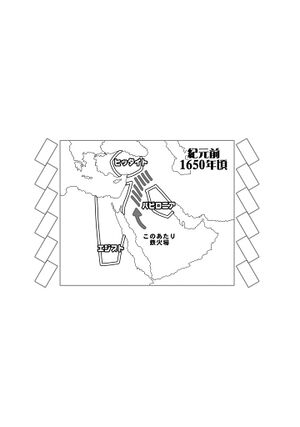
Kuwajiri displayed a new map.
“Let me describe the situation for you. It started with several stable forces with only internal conflicts.”
- Mediterranean Coast
- Aegean Civilization
- Greek Mythology
- Nile Region
- Middle Kingdom Egypt
- Egyptian Mythology
- Middle East
- Babylonian Dynasty
- Babylonian Mythology
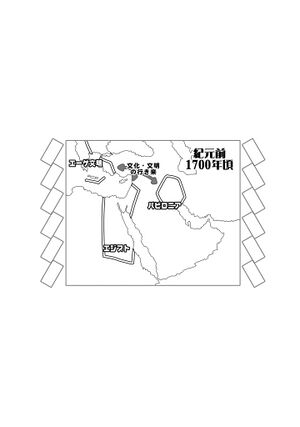
“And then the, um, Hittites and Kassites attacked?”
“Specifically, they attacked the Middle East. The Middle East portion looked like this.”
- Middle East
- Hittites (North)
- Hurrian Mythology
- Kassites (South)
- Babylonian Mythology
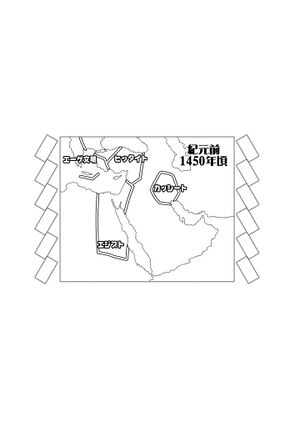
“What, so the Kassites inherited the Babylonian mythology? They need to be more thorough about eliminating their enemy.”
“Aunt! Aunt! It isn’t time for that!”
“I honestly don’t know much about what came after me, so I’m surprised to see how long our mythology lasted, even if it did change form along the way.”
“The Kassites were originally neighbors to Babylon, so while they did fight some skirmishes, Babylonian culture managed to work its way into their own culture. That is how they managed to usurp the Babylonian dynasty in something of a coup d'état and kept the existing systems running as they held a stable rule for around 300 years.”
A hand went up.
“What in the world is Hurrian mythology?”
●
<Hurrian mythology is the mythology of the Hurrians, an ethnic minority that lived in various parts of Mesopotamia. They are known for being so close to several major mythologies yet showing little to no influence from those mythologies while in turn influencing other mythologies with a few of their own stories.>
“The Hurrians were kind of famous in our time. They were great at pottery and metallurgy and our Sumerian word for ‘copper’ comes from the Hurrian language.”
“Indeed. In our time, the Hurrian kindgoms began to make their presence known in the ore trade from Anatolia. They had a lot of copper, silver, and tin, but not much gold.”
“The Hurrians visited us too, but they were there to buy gold. I’ve heard Egyptian gold dust made its way to Mesopotamia that way.”
<Those skilled people later joined with the Hittites to form the Hittite Kingdom.>
“I see,” said Bilgamesh, but then he tilted his head. “At the time, it was something of a mystery where their small kingdoms had come from.”
<To answer that ancient question, the Hurrians are thought to have traveled south from the Caucasus to reach the Middle East at around 4000 BCE.>
“Huh? So they were European?”
<They came from the Caucasus, so they would be Caucasian. The global climate was calm from 5800 – 4000 BCE, allowing for population growth. So it is thought a technically skilled mountain people in the Caucasus migrated to Anatolia where trade was booming. A drought began in the Middle East at around 3800 BCE, but that mountain people did not rely on agriculture and the land they could live off of began to shrink.>
<Now,> said Balancer. <The interesting part from a mythological perspective is how the Hittite Kingdom was strongly influenced by Hurrian culture and they had a unique mythology compared to the other major mythologies in the region. What influence would that have as people migrated?>
A hand went up. Athena’s.
“If the Hittites controlled Anatolia and Egypt held the east and south of the Mediterranean, then Hurrian mythology and Egyptian mythology would form a ‘wall’ preventing Greek mythology at the Aegean Sea from reaching the Middle East. And Babylonian mythology was also blocked by that ‘wall’, keeping it from reaching the Mediterranean afterwards.”
<Right. After this period, civil wars were fought and several kingdoms rose and fell in Mesopotamia, but Babylonian mythology gradually faded away because that ‘wall’ kept it from reaching other regions. The direct transmission of Babylonian mythology advanced the cuneiform phonograms and had its final peak as a simplified language at around the 15th century BCE. But…>
“That is the same time our Olympus mythology was formed. You could say it didn’t quite arrive in time to spread. But afterwards, not much managed to spread between Europe and the Middle East, right?”
“It did pass through us to spread second-hand via the Mediterranean trade. But…there are a few more examples, right, Balancer?”
Balancer tilted as a nod to Touto’s question.
<When the Hittites went wild in the Middle East, they also invaded Egypt. At the time, Egypt was fairly weak and there was a lot of internal betrayal going on, so they lost a lot of land. A lot of fighting happened in the Syrian region, so a foreign group known as the Hyksos arrived in Egypt with riders and chariots and ruled Egypt for a period.>
“I know you’re talking about my country, but wow. Then again, we did fight tons of wars, did a lot of trade, and a ton of immigrants arrived from Asia, so maybe it isn’t too surprising.”
She brushed it off like it was nothing. But then she sighed.
“Those Hyksos were apparently part of the Mediterranean trade and they left a lot of their culture in Egypt along with the other immigrants. Like the gods of the Syrian region.”
But…
“The wildest thing about them is that, after taking us over, they made Set, our top delinquent god, into our main god just because he was so much like Baal, who they worshiped.”
“One theory is that they worshiped Set to curse the opposing forces within Egypt.”
“So like if someone made Typhon our main god to crush the Zeus-focused version of our mythology?”
“Wow,” they all gasped.
<Anyway, all of this remade Egyptian mythology and added new stories. The Hyksos rule in particular is when other mythologies began to influence the Egyptian stories, giving the gods more character.>
“Around that same time, we were cut off from the influx of other major mythologies, so we spread across the Mediterranean and even influenced Roman mythology, right?”
<Correct,> said Balancer.
Then Kuwajiri pointed to the Hittite Kingdom in Anatolia.
“The area from Anatolia on north and from the Caucasus to the Russian region was cut off from the major existing mythologies. The nature of those lands meant the peoples there were primarily nomads, so the agricultural societies who followed those major mythologies tended to view them as barbarians. But…”
She indicated the map again. She now used it as a map of the area east of the Mediterranean.

“From a mythological perspective, the area from the Black Sea to the east Mediterranean was blocked off by those barbarians. That meant Greece had no land route to Asia and Egypt. Then Persia rose in the east, blocking off their route to the east. This cutting off of culture and civilization began in around 1500 BCE. Many kings and states attempted to break through, but none of them were successful until Alexander III’s conquest which began in 335 BCE.”
A breath.
“Until 1500 BCE, the cultures, civilizations, and mythologies of Greece, the Mediterranean, and the Middle East had spread a fair bit and he linked them by a land route for the first time in about 1200 years.”
●
<When 1200 years have passed, the origins of the gods created by past cultural transmission can be hard to determine. That is why those regions have gods they have worshiped for a long time which are “similar” or “have identical roles”.>
<So,> said Balancer. <I thought this digression might actually be useful before today’s meeting of the gods. Because we have Mesopotamian, Greek, Egyptian, and barbarian gods here. Norse mythology counts as a barbarian culture mythology in this case.>
“Doooon’t forget about meeee.”
“There’ll be others there too. And Sumeragi’s group are the biggest example of an ‘other’ group.”
<They are a separate matter. …Now, I will not ask that you four mythologies get along. I am simply saying that you would not be who you are or have been remembered at all without each other.>
“It’s really weird that our metal industry was supported by the ancestors(?) of a later barbarian mythology.”
“When you go beyond your parents and to relatives several generations past, you can never predict what kind of influence they had.”
<Right. Your lands fought, joined together, broke apart, and collapsed, but you are not fundamentally enemies. Which is why you are able to hold a meeting of the gods. We are admittedly short on humans, but that idiot will take part this time.>
And just as Balancer said that…
“Guess who’s here!”
The idiot had finally arrived.
Interlude[edit]
“This is my first time seeing the process after one of Sumeragi-shi’s rollbacks…but it’s awfully casual, isn’t it?”
“That doesn’t lighten my workload any, so be very careful about telling him that.”
| Back to Chapter 12 | Return to Main Page | Forward to Chapter 14 |

















